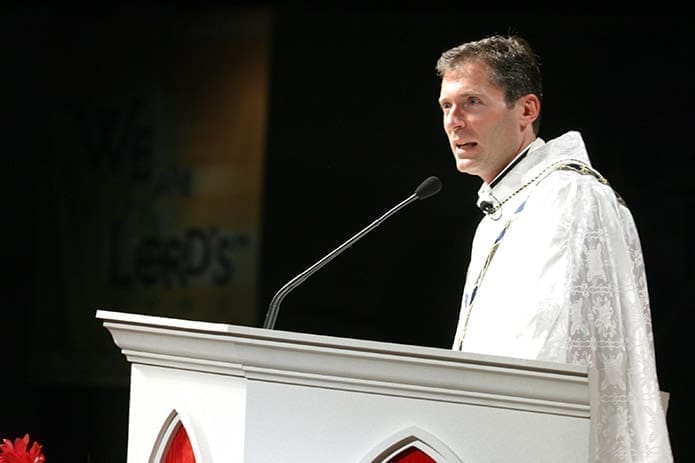 Photo by Michael Alexander
Photo by Michael Alexander
Priest At Rome Seminary Reflects On Pope’s Legacy
By Gretchen Keiser | Published February 14, 2013
ROME, Italy—Father Luke Ballman, a priest of the Atlanta Archdiocese, works and teaches at the Pontifical North American College in Rome, so near to St. Peter’s Square he can hear the pope’s voice when his addresses are broadcast by loud speaker.
His sense of this historic moment in the life of the Church is that it caught everyone by surprise and seminarians, like others, rushed over to St. Peter’s Square Feb. 11 “to be physically close to the Holy Father at this time.”
“When something happens to a person we love, a significant event, whether it is joyful or sad, we want to be physically close. The natural reaction of a lot of the men was just to get as physically close to the pope as they can. To pray, to be there, to be with others who are experiencing a wide range of emotions,” said Father Ballman, the director of apostolic formation at the seminary.
“One man shared with me that his teacher came into class. He began the class with a prayer and he broke down crying because he just was overcome with emotion.”
Pope Benedict XVI quietly told a group of cardinals that morning that he would step down as pope on Feb. 28 due to the frailties of age. It’s been almost 600 years since a pope has stepped down, but it is permitted under canon law.
“Just two days ago on Sunday, I did not see the Holy Father, but I heard him over the loud speaker. He sounded strong. He sounded vibrant. I don’t know that anyone saw this coming. … It sent shock waves everywhere, beginning here in Rome,” Father Ballman said.
Whether it’s shock, sadness, uncertainty, the rare nature of the pope’s decision to step down at the age of 85 leaves Catholics pondering its import and meaning.
“I believe that the Holy Father is doing what he believes is the right thing to do. I believe he is very close to God. I believe he listens very attentively to the Holy Spirit. If he believes that this is what is right for him and for the church, I trust that. I think that this is a moment where we are all called to trust and believe and have faith that the Holy Spirit is guiding the church right now just as he was at our inception 2,000 years ago,” Father Ballman said.
“Most of the people I’ve talked to, the major reaction I’ve heard is one of support, of love and affection, of OK, if you’ve made this decision, we trust your decision. You are our Father. We trust, love and support you in your decision.”
He is grateful for personal opportunities in his priesthood to learn from the example of Pope Benedict XVI.
Crossing the piazza as a seminarian in the late 1990s, he occasionally saw then Cardinal Joseph Ratzinger, head of the Congregation for the Doctrine of the Faith, walking. The cardinal would greet the seminarians, speaking to them in English, “always very warm and welcoming.”
Cardinal Ratzinger ordained Father Ballman and his classmates as transitional deacons in October 1999 and the class met with him to hear his insights on the church and the priesthood.
Since he came to work in Rome in 2011, Father Ballman said he has attended papal audiences and last spring accompanied Archbishop Wilton D. Gregory and Auxiliary Bishop Luis R. Zarama when they met with the pope as part of their five-year report on the archdiocese. He was able to thank the pope for his guidance.
He hopes there will be some opportunity for the Catholic Church universal to express their gratitude for Pope Benedict’s service.
“I think the ritual of saying goodbye, of publicly recognizing the great legacy of this pope, that’s important,” he said.
On Feb. 12, the public learned the pope’s Mass on Ash Wednesday, Feb. 13, would be his last public celebration of Mass as pope.
“I would have hoped we could as a church have some universal public expression of thanksgiving,” Father Ballman said.
When asked what he would cite as the pope’s legacy, the former archdiocesan vocations director said, “For me personally, I would say a priest who has been and continues to be faithful in his ministry from the moment of his ordination even until now.”
“He is a witness of fidelity for me in my priesthood and an example of selfless giving of oneself to God and to the church in his vocation.”
“Whether it is the call to priesthood, the call to the episcopacy, the call to be a great theologian, the call to come to Rome to head up the Congregation for the Doctrine of the Faith, the call to be pope, and now the call to resign, all of that legacy is something we can learn from,” Father Ballman said.